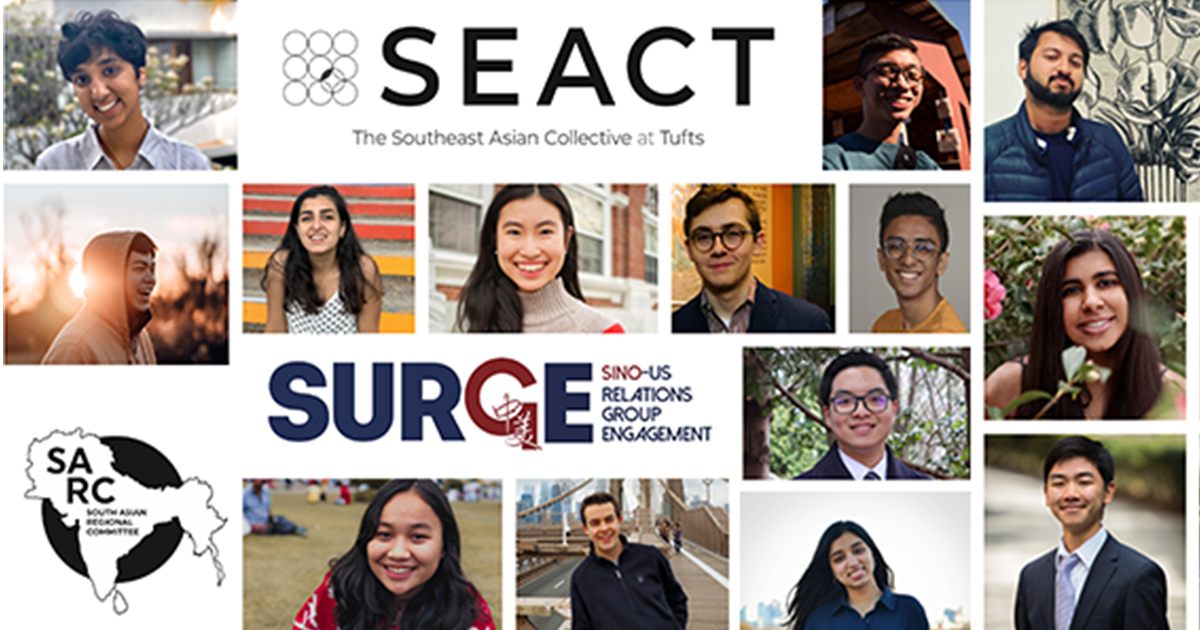Tufts Asian Affairs Group (TAAG)

“We wanted to start our groups on campus because we saw a gap in undergraduate discourse about the South Asian subcontinent. We spent some time talking to our peers on campus and saw that there were so many people who would be interested in a club like this, so we were inspired to start it. We wanted to house our group at the IGL because after my participation in this year’s EPIIC class, I was introduced to the amazing resources and alumni network it has. I knew it would be the perfect fit for our group because we have the same mission, which was to encourage people to engage in critical thinking and analysis of the world and its current affairs.” – Meera Rohera (A’22)
The Tufts Asian Affairs Group (TAAG), founded at the start of the spring semester, is a student-run organization of several subgroups that promote awareness and understanding of the histories, politics, economics, and issues in the region. TAAG’s mission is to provide opportunities to learn about historical and contemporary issues in Asia through weekly discussions, panels, conferences, publications, and research.
TAAG, much like Tufts International Development (TID), is divided into three sub-groups by focus: the South Asian Regional Committee (SARC), the Southeast Asian Collective at Tufts (SEACT), and Sino-U.S. Relations Group Engagement (SURGE).
The Tufts South Asian Regional Committee (SARC) is an academic discourse and research group focusing on Afghanistan, Bangladesh, Bhutan, India, Maldives, Nepal, Pakistan, and Sri Lanka. SARC focuses on social, political, historical and economic affairs, emphasizing current issues facing the South Asian subcontinent. SARC co-hosted, with Center for South Asian and Indian Ocean Studies at Fletcher, a panel on Indian Democracy in the Age of Hindutva earlier in the semester. The panel focused on the pillars of Indian democracy in light of the recent passing of the Citizenship Amendment Act and the National Register of Citizens, the abrogation of Kashmir’s special status, the Ayodhya verdict, and the unprecedented state-sponsored violence against student protesters. Before the onset of COVID-19 closed the campus, SARC had been planning a number of panels for April. SARC hopes to create a space for students of all backgrounds, ideologies, Identities and ages to come together to develop a nuanced understanding of the region.
The Southeast Asian Collective at Tufts (SEACT) provides an academic space for the discussion of Southeast Asia affairs and issues such as the regional dynamics of the history of Southeast Asia, security challenges and partnerships, and regional trade and business. In addition, SEACT aims to provide a platform for Southeast Asian issues to be publicized and discussed, as well as to contribute a regional perspective to other on-campus discussions. To that end, SEACT seeks to position itself as a sustained “think tank” student organization of individuals interested in political, economic, and cultural issues of Southeast Asia. Aside from their planned discussions, SEACT will be launching a speaker series in the fall semester to engage experts on topics such as ASEAN centrality and, in light of the current situation, the regional response to COVID-19. SEACT wants to collaborate with clubs on campus and in other universities to publish student work on the region.
The Sino-U.S. Relations Group Engagement (SURGE) returns to the Institute, where it was founded as part of Alliance Linking Leaders in Education and the Services (ALLIES) in 2007. It was created to promote and expand the understanding of the world’s largest bilateral economic and political relationship. For 13 years, SURGE has hosted and sponsored a vast range of activities and events in order to explore the many facets of both the Sino-U.S. relationship and East Asia. SURGE hosts an annual China-U.S. Symposium (CUS), an academic conference that fosters positive relations between China and the United States and cultivates learning among students and experts from different backgrounds. With a different theme each year, the CUS has looked at topics from Technology to Economics to the Environment, and has hosted prominent speakers such as former Ambassador to China, J. Stapleton Roy; Acting Assistant Secretary of Defense for Indo-Pacific Security Affairs, David Helvey; Singapore’s Ambassador to the United States, Ashok Mirpuri; and the first Chief Secretary of Hong Kong, Anson Chan. As part of CUS, SURGE also runs the David Rawson Memorial Lecture. In addition to its symposium, SURGE hosts bi-weekly discussion meetings, lecture series, and book talks throughout the semester.
“SURGE is a place where people with different interests in the US-China relationship could gather, to exchange ideas and learn from each other and our distinguished guests as well. Till today, it is the leading space on campus to discuss what is the most significant geopolitical relationship in the 21st century. But above all, SURGE is a place where people who had similar academic interests become people who care for each other outside of intellectual discussions.” -YJ Chee (A’19).
As the region continues to ascend on the world stage, there is an increasing importance in understanding and engaging in discourse on Asia that TAAG plans to bring to the Tufts campus.
